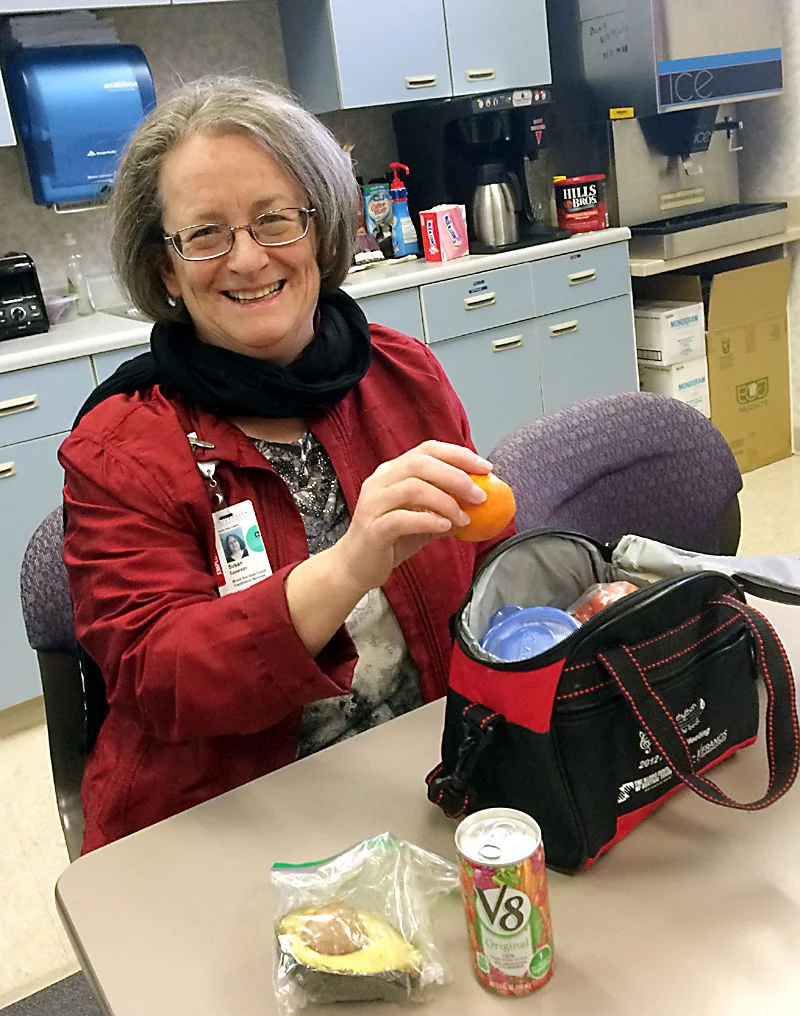When Susan Epperson received some questionable A1C results, she knew it was time to make changes. Her elevated blood glucose levels were troubling — possible precursors of type 2 diabetes. But Epperson had made lifestyle changes before, and the results had been less than successful. It was time for a little help.
That assistance came in the form of the Diabetes Prevention Program now offered through UCHealth Diabetes and Medical Nutrition Therapy in northern Colorado. The program is based on the Center for Disease Control and Prevention’s National Diabetes Prevention Program, and offers learning and support to help those with signs of prediabetes make permanent lifestyle changes.

For Epperson, who sits much of the day in her position as blood service quality coordinator at PVH, the assistance was just what she needed.
“When I got my test results, my first reaction was to cut carbs and sugar out of my diet,” she said.
She tried that method on her own, but when her blood sugar levels were retested, the results were still too high.
“It panicked me a little,” she recalled.
Epperson enrolled in PVH’s new Diabetes Prevention Program, which is fully covered by her Anthem insurance, after getting back her annual health test results. The program is based on the CDC’s National Diabetes Prevention Program, and offers learning and support to help those with signs of prediabetes to make permanent lifestyle changes.
Epperson does not have a family history of diabetes. Neither is she morbidly obese; in fact, Epperson walks every day and practices yoga several times a week. She felt pretty good about her health.
But the test was telling, and her knee-jerk reaction to cut carbs and sugar didn’t make a difference. In fact, replacing carbs and sugar with high-fat, high-protein options was counterproductive to her goals.
“Through the program, I learned that what I was doing was actually making matters worse,” Epperson said.
To date, Epperson has dropped 7 percent of her weight, about 14 pounds. She attends a class every week that teaches her strategies for living: managing stress, eating well and increasing physical activity.
The program debuted at PVH in September 2015, with 16 UCHealth employees joining. A second class followed at Medical Center of the Rockies. The curriculum includes 16 weekly classes followed by seven monthly classes. The class is open to those age 18 and up who have a body mass index (BMI) equal to or greater than 24 (22 for those of Asian ethnicity), who have had lab tests or screenings that point to prediabetes, or who have a history of gestational diabetes.
“The first 16 weeks are very important,” said Linda Schoon, diabetes prevention program coordinator at the UCHealth Diabetes and Medical Nutrition Therapy in northern Colorado. “The class is an hour long — very feasible — with weigh-ins and goal setting.”
Why 16 weeks?
“We really dig deep into lifestyle, and change takes time,” Schoon said.
The weekly curriculum is focused on weight loss and is based largely on research that found people who lost 5 to 10 percent of their body weight and participated in 150 minutes of exercise per week reduced their chances of type 2 diabetes by a whopping 58 percent — 71 percent for those over age 60.
The majority of those who signed up for the class, according to Schoon, were attracted by the powerful incentive to prevent diabetes. Many had struggled for years with their weight and had tried other diets in the past with little success. What makes this program successful, Schoon said, is the instruction in “lifelong habits for eating and exercise.”
It is estimated that 86 million Americans age 20 or older have high blood-glucose levels that could lead to diabetes. Yet, only about 11 percent of those individuals know that they are prediabetic and obesity is the major risk factor.
In the first 16 weeks, program participants learn about healthy eating, portion control, reducing unhealthy fats in the diet, managing their environment around eating (no more stress eating), triggers that may lead to overeating, and behavior modifications that focus on a healthier lifestyle. At the same time, they work on increasing their physical activity in manageable and enjoyable ways.
The goal for participants is to lose 7 percent of their body weight. While not everyone is successful in the first 16 weeks, the ongoing monthly classes allow participants to continue to work toward that goal or maintain their progress. It is the full-year curriculum that provides participants the support they need, added Schoon, who also provides individual support if needed.
The group setting allows members to provide each other support, commiserate over obstacles and celebrate progress. Epperson, a self-described introvert, was pleasantly surprised by the benefits she gained from her classmates. In addition to the overall support, she came away with practical advice, like an app to monitor her diet and track exercise.
Still attending the weekly classes, Epperson is already feeling the benefits of her weight loss. She also is motivated to continue losing weight, with a goal of dropping another 10 pounds.
“I still enjoy what I eat, but now I am just making smarter choices,” she said.
Currently, Anthem insurance pays for the class for eligible insured participants. UCHealth also offers scholarship funds for those who are not insured but meet the requirements.
For more information contact UCHealth Diabetes and Medical Nutrition Therapy in northern Colorado at 970.495.8205.
